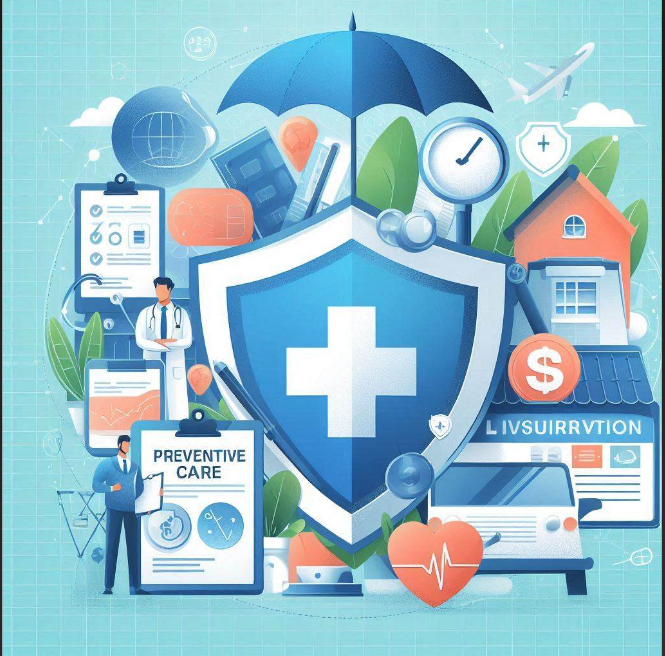The Impact of Health Insurance on Preventive Care
In today’s fast-paced world, health insurance plays a crucial role in safeguarding our well-being. While many view health insurance as a safety net for unexpected medical expenses, its impact on preventive care is equally significant. This blog post delves into the vital connection between health insurance and preventive care, exploring how “Health Insurance Care” can transform lives by promoting healthier habits and early detection of diseases.
Understanding Preventive Care
Preventive care refers to measures taken to prevent diseases rather than treating them once they occur. This includes routine check-ups, screenings, vaccinations, and counseling. The goal is to detect health issues early, when they are more manageable, and to promote healthy lifestyles that can prevent the onset of chronic conditions.
The Role of Health Insurance in Preventive Care
Health insurance plays a pivotal role in making preventive care accessible and affordable. Here’s how:
- Coverage for Screenings and Check-ups: Most health insurance plans cover essential screenings and annual check-ups without requiring copayments. This encourages individuals to undergo regular health assessments, leading to early detection of potential health issues.
- Vaccinations: Immunizations are crucial in preventing serious illnesses. Health insurance plans typically cover vaccines for diseases such as influenza, hepatitis, and human papillomavirus (HPV), making it easier for individuals to stay protected.
- Access to Health Services: Health insurance provides access to a network of healthcare providers, ensuring that individuals can receive the preventive services they need without significant financial burdens.
- Health Education and Counseling: Many health insurance plans offer resources for health education and counseling. This can include smoking cessation programs, weight management support, and nutritional counseling, all of which are essential components of preventive care.
Benefits of Preventive Care Through Health Insurance
- Early Detection of Diseases: Regular screenings and check-ups can identify health issues at an early stage, leading to more effective and less costly treatments.
- Reduced Healthcare Costs: Preventive care can significantly lower healthcare costs by preventing the progression of diseases and reducing the need for expensive medical treatments.
- Improved Quality of Life: By focusing on prevention, individuals can maintain better overall health, leading to a higher quality of life and increased productivity.
- Lower Mortality Rates: Preventive measures, such as cancer screenings and cardiovascular assessments, can reduce mortality rates by catching diseases early when they are more treatable.
Challenges in Preventive Care Utilization
Despite the benefits, there are challenges in maximizing the impact of health insurance on preventive care:
- Awareness: Not everyone is aware of the preventive services covered by their health insurance plans. Increasing awareness through education and communication is essential.
- Accessibility: While health insurance improves access, there can still be barriers such as transportation, availability of providers, and socio-economic factors that affect the utilization of preventive services.
- Behavioral Factors: Personal habits and perceptions about healthcare can influence the uptake of preventive services. Encouraging a proactive approach to health is crucial.
Conclusion
Health insurance is more than just a financial safety net; it’s a vital tool in promoting preventive care and fostering a healthier society. By making preventive services accessible and affordable, health insurance care encourages early detection of diseases, reduces healthcare costs, and improves overall quality of life. As we continue to advance in healthcare, the emphasis on preventive care through robust health insurance coverage will remain a cornerstone of a healthier future.
FAQs on Health Insurance and Preventive Care
Q1: What is preventive care?
A1: Preventive care involves measures taken to prevent diseases, including routine check-ups, screenings, vaccinations, and health counseling, aimed at detecting health issues early and promoting healthy lifestyles.
Q2: How does health insurance support preventive care?
A2: Health insurance supports preventive care by covering the costs of essential screenings, vaccinations, check-ups, and health education services, making them more accessible and affordable for individuals.
Q3: Why is preventive care important?
A3: Preventive care is important because it helps in the early detection of diseases, reduces healthcare costs, improves the quality of life, and lowers mortality rates by addressing health issues before they become severe.
Q4: Are all preventive services covered by health insurance?
A4: Most health insurance plans cover a wide range of preventive services, but the specific coverage can vary. It’s essential to review your insurance policy to understand what services are included.
Q5: How can I find out which preventive services are covered by my health insurance?
A5: You can find out which preventive services are covered by reviewing your health insurance policy, visiting your insurer’s website, or contacting their customer service for detailed information.
Q6: What should I do if I face barriers in accessing preventive care despite having health insurance?
A6: If you face barriers such as transportation issues or lack of available providers, contact your insurance company for assistance. They may offer solutions or resources to help you access the necessary preventive services.

